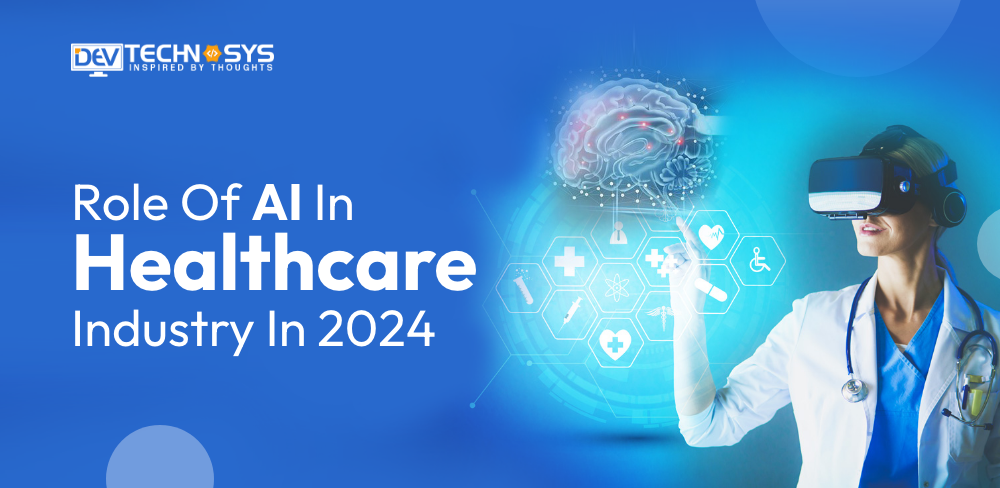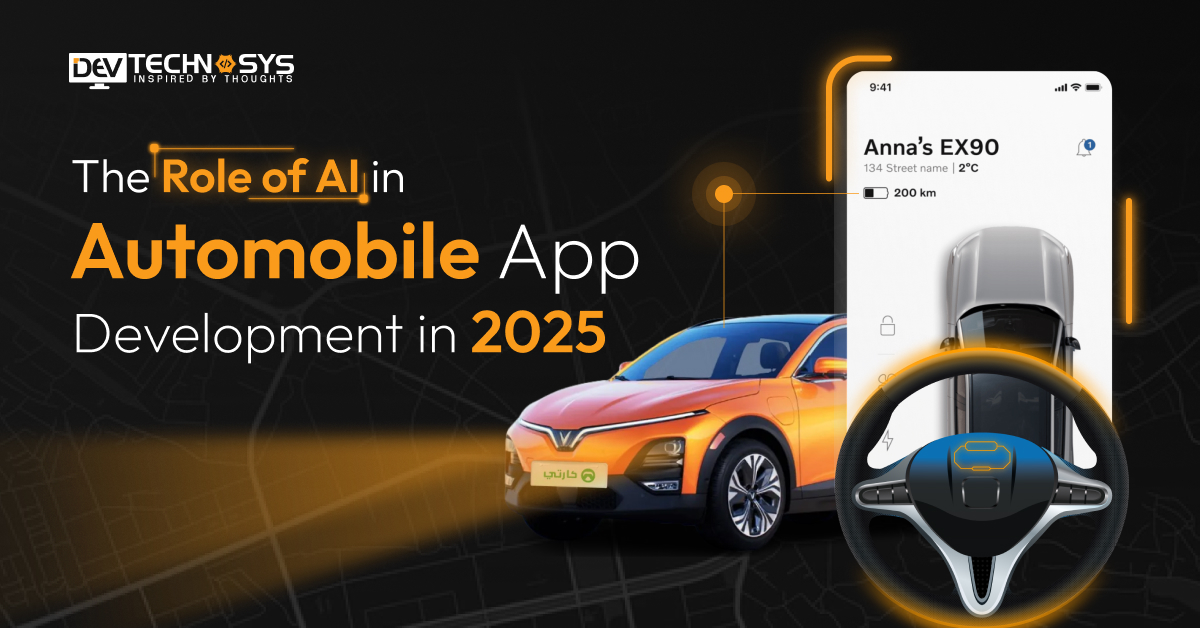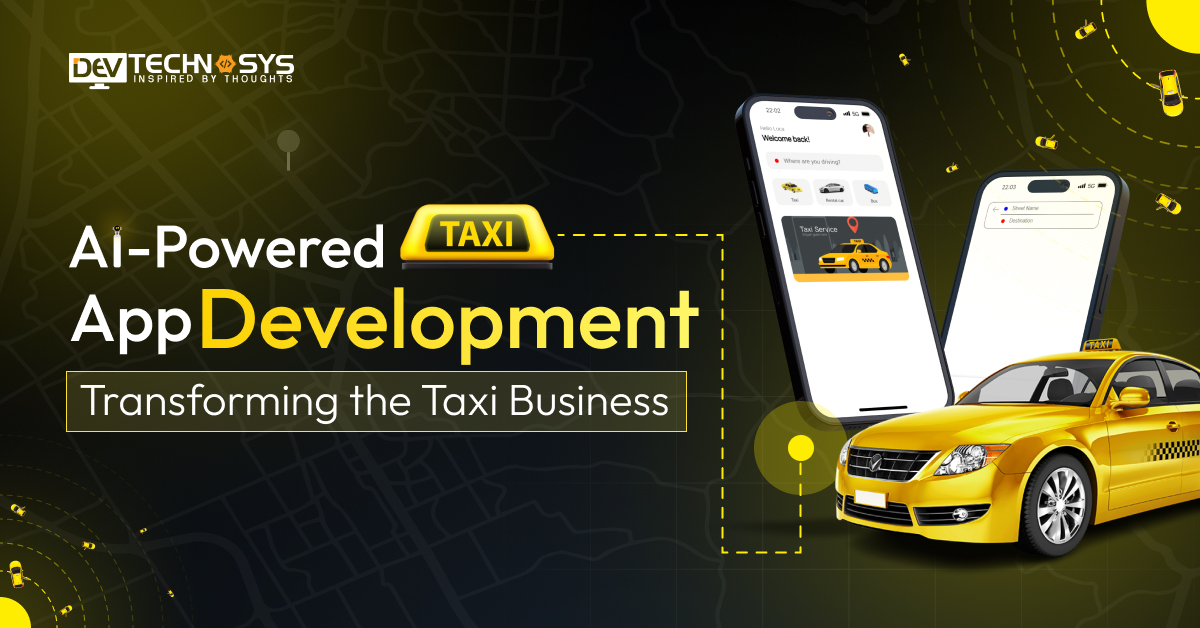“AI can help bridge healthcare disparities by improving diagnosis and treatment access in underserved areas.”
Artificial intelligence will play a major role in the healthcare industry, which is constantly evolving and where efficiency and precision are key. In 2024, AI will be a major force in healthcare, transforming the way that we view medical diagnosis, Treatment, and patient care.
AI in healthcare industry represents more than just a technological advancement; it is a fundamental change in how medical services are delivered.
This blog explores the role of AI in healthcare industry, its current and potential applications, its use cases, and the challenges that it addresses.
So, let’s begin.
What is AI in Healthcare Industry?
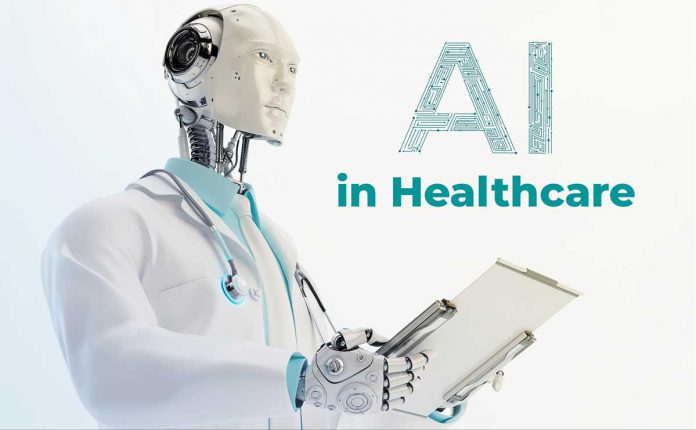
Artificial intelligence in healthcare industry refers to the use of AI technologies, including machine learning and natural language processing, to enhance patient diagnosis, care, and Treatment. The analysis of large amounts of patient data is used to help in early disease detection and personalized treatment plans.
AI can be used to improve administrative tasks, optimize hospital operations, and streamline medical studies. In this rapidly evolving landscape, the trending app & web solutions play a pivotal role in harnessing the power of artificial intelligence to drive innovation and improvements in the healthcare industry.
AI has the potential to revolutionize healthcare services by enhancing decision-making, reducing error rates, and delivering more effective and efficient care.
Market Insights of AI in Healthcare Industry

Source: Statista
- Artificial intelligence (AI) in the healthcare industry was valued at around 11 billion U.S. Dollars worldwide by 2021. The global healthcare AI market was predicted to be worth nearly 188 billion U.S. dollars by 2030. This is a 37 percent compound annual growth from 2022- 2030.
- Healthcare data integration and Natural Language Processing will be the most popular AI software used in healthcare around the world in 2021.
- Over this period, it is estimated that the market will grow from approximately one billion dollars to more than 28 billion U.S. Dollars.
- A survey of healthcare leaders from the United States found that 41 percent of respondents reported their AI usage was fully functional as of 2021. Another 26 percent reported that their AI system is moderately functional, while five percent stated they have not yet implemented an AI system.
- Sixty-five percent of respondents in the pharmaceutical and healthcare industries state that artificial intelligence deployment helps improve quality control.
Role of AI in Healthcare Industry
Artificial intelligence has been used successfully in healthcare in many instances. There are also countless possibilities for its future involvement. We will examine some of the positive ways that AI can impact the healthcare profession that an on-demand app development company recommends.
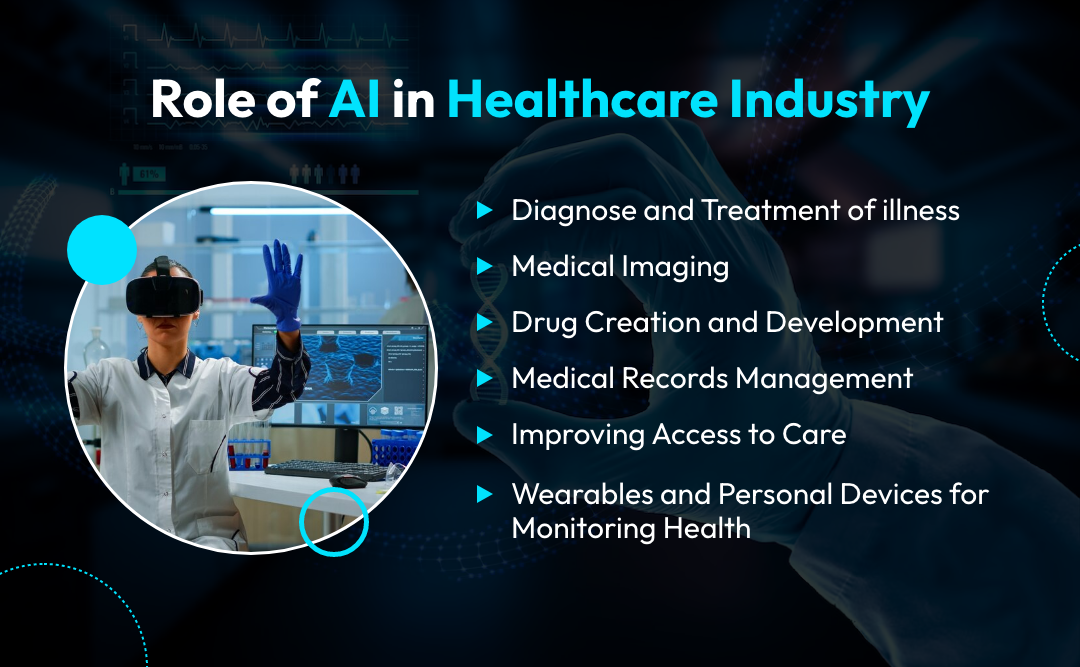
1. Diagnose and Treatment of illness
In healthcare, machine learning could be used for detecting more complex conditions that are not immediately obvious when someone is diagnosed. Patients’ conditions might be tracked with the use of technology, which could notify them if anything becomes worse. AI technology could then collect vital data to alert medical professionals.
2. Medical Imaging
AI is being used for medical imaging. This follows research that suggested that AI was as good as radiologists at detecting cancer and other diseases. AI healthcare is not only important for early detection, but it also allows medical images to be examined more quickly and thoroughly. This eliminates the possibility of human error.
3. Drug Creation and Development
AI in medicine holds the potential to revolutionize drug discovery by analyzing existing drugs and data. The healthcare mobile app development industry can harness this technology to create efficient platforms that accelerate the discovery of promising new drugs, reducing costs and saving time in the otherwise lengthy and expensive process.
4. Medical Records Management
AI, as we’ve already mentioned, could be a useful tool for collecting and analyzing information, like medical records. This not only helps medical professionals work more efficiently but also allows them to prioritize other aspects of their jobs.
5. Improving Access to Care
There is always a shortage of medical professionals. This problem is even worse in developing countries. AI can help fill in skill gaps, diagnose patients, and provide life-saving Treatment to all people around the globe.
6. Wearables and Personal Devices for Monitoring Health
Smart devices and wearables have been used to conduct digital consultations in healthcare apps. Additionally, you should hire dedicated developers to develop AI-powered apps that can easily integrate with smart devices. These technologies will only increase in use as they allow medical professionals to act at the first signs of a problem and provide treatment to patients as quickly as possible.
Top 5 AI-Powered Healthcare Apps
| AI-Powered Healthcare Apps | Available Platforms | Downloads | Ratings |
| Noom | Android | iOS | 10M+ | 4.1 |
| Youper | Android | iOS | 1M+ | 4.1 |
| Happify | Android | iOS | 500K+ | 3.5 |
| ADA | Android | iOS | 5M+ | 4.7 |
| Talkspace | Android | iOS | 500K+ | 4.5 |
1. Noom
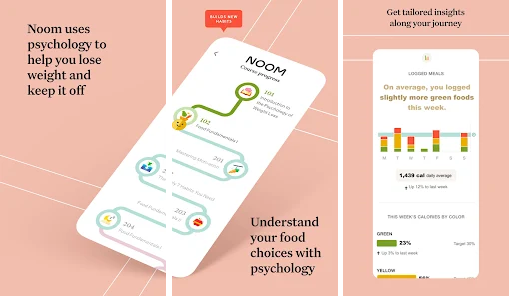
Noom is a healthcare app powered by AI that’s designed for those who want to live a healthier life and lose body fat. After assessing the user’s weight, age, and height, it gives them expert advice. Its weight-loss program was designed by psychologists and scientifically proven to produce real, sustainable results.
Noom is based upon the principles of Psychology, and the software uses passive behavioral strategies that trick your body into adopting healthier lifestyles to stay fit. Persuade the body to adopt healthy habits to maintain fitness.
2. Youper
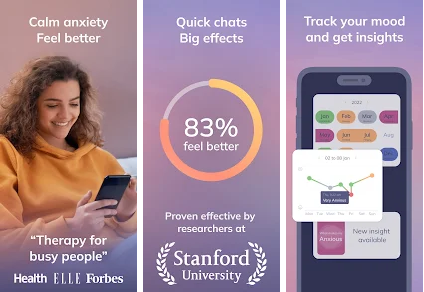
Youper is an artificial intelligence-powered mental health aide that facilitates mindfulness exercises and discrete, empathetic conversations. Chatbots offer users a variety of coping mechanisms that can help them resolve interpersonal issues during the exchanges.
With the assistance of an experienced custom software development company, you can also integrate the chatbot functionality into your software. This simple and beautiful application could be used as an additional tool for professional mental health counseling.
3. Happify
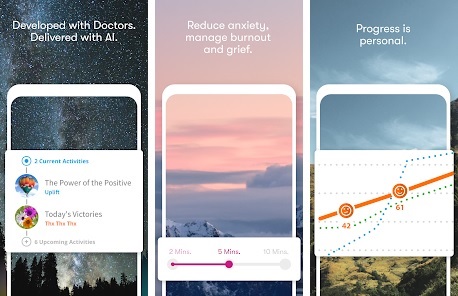
Happify is another app that uses a unique approach to tackle mental health issues. Anna, a teacher with artificial intelligence (AI), supervises the activities. It is a practical tool and service that helps you to regain control of your emotions and moods. However, one such app that is highly integrated with AI technology is Practo, which is gaining popularity. So, if you are planning to invest in an AI-powered app, then you must build an app like Practo.
4. ADA
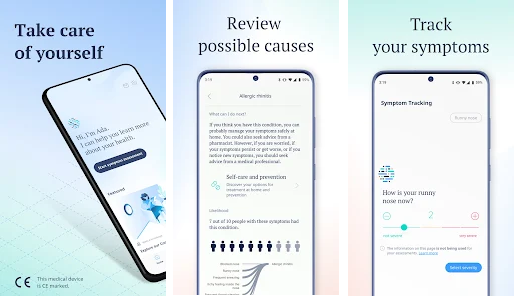
Using artificial intelligence in the healthcare app’s instant messaging feature, users may report their issues. Users are questioned simply by ADA’s AI technology to gain a better understanding of their circumstances. ADA uses identification, convergence, and knowledge extraction to extract data from its digital library in order to help users better understand their health.
5. Talkspace
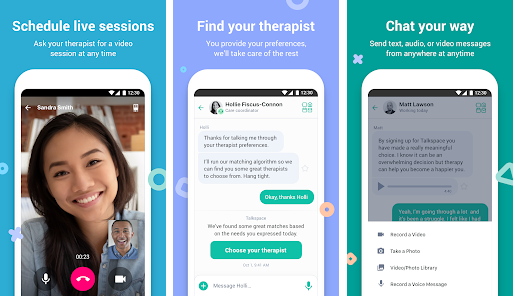
This generation is looking for a platform that is solely dedicated to mental health, as well as remote access to qualified counselors and psychological support. Due to the pressures of work, people may not be able to afford expert help. A healthcare app powered by AI is designed to match users with therapists who can understand the patient’s needs once they have responded to questionnaires. The app either matches the user to the best therapists or allows them to choose their own.
Real-World Examples and Use Cases of AI in Healthcare Industry
Applications of AI have proved very beneficial to the healthcare sector. AI has proven useful in a variety of applications, including diagnosis accuracy and hospital efficiency maximization. Here are some examples of how artificial intelligence is transforming healthcare and propelling the sector into the digital age.
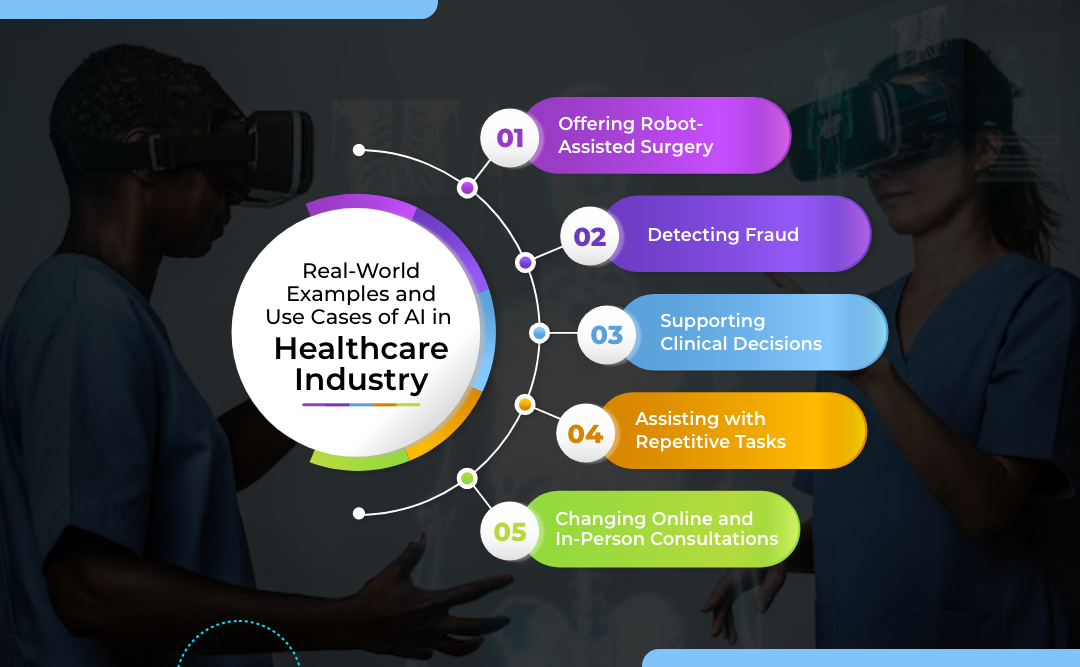
1. Offering Robot-Assisted Surgery
AI is used in many different ways to improve healthcare. Also, AI and collaborative robotics have revolutionized surgery, reducing risks of pain, blood loss, and other side effects. AI and healthcare can also help surgeons perform more complex surgeries, resulting in a faster and easier recovery.
Maastricht University Medical Center, for example, uses robotics in healthcare in order to suture tiny blood vessels. Some of these vessels are no thicker than 0.03 millimeters. By utilizing healthcare artificial intelligence, surgeons can obtain up-to-date insights and information on a patient’s condition.
In order to attain the greatest results, these AI-backed data empower medical professionals to make prompt, wise decisions both before and after surgeries.
2. Detecting Fraud
Three percent of all medical claims are fraudulent, based on the US Justice Department. This translates to a loss of $100 billion per year. AI-based healthcare allows professionals to detect invalid claims, speeding up processing, approval, and payment for valid ones.
AI in healthcare can detect insurance fraud and prevent patient data theft. AI for healthcare is being used by top healthcare organizations, including Harvard Pilgrim Health, to fight healthcare fraud. However, various businesses also utilize advanced technologies for healthcare app development, like AI fraud detection, smartwatch monitoring technologies, etc.
3. Supporting Clinical Decisions
AI and ML are changing how clinical providers make their decisions. AI provides data that can assist healthcare professionals with diagnosing, planning Treatment, and managing health. Additionally, it facilitates decision-making in data-intensive disciplines such as ophthalmology, pathology, and radiology.
Artificial intelligence (AI) could be able to automate certain activities soon. Clinical notes may be converted into EHRs by AI utilizing natural language processing. Clinicians only need to enter data once because of this.
4. Assisting with Repetitive Tasks
The healthcare industry is moving to the world of Cognitive Assistants, which have the capability of reasoning, analytics, and a full range of medical knowledge. A recently released algorithm called Medical Sieve is supposed to aid in radiology and cardiology decision-making.
The cognitive assistant uses radiological image analysis to find issues more quickly and precisely. Medical Sieve is a great example of AI in healthcare industry. There are also other examples, such as Enlitic, which mixes deep learning and medical data in order to improve diagnostics and patient care. AI examples in healthcare
5. Changing Online and In-Person Consultations
Babylon App shows how AI can be used to change doctor consultations. The app provides online healthcare and medical consultations and offers the best AI advice according to a patient’s history of medical conditions and knowledge.
Invest in AI-powered software development with the assistance of a full-stack development services provider, which can help users submit their symptoms through this AI software. It then uses voice recognition to match the symptoms to the illness database.
Prior to making a recommendation, the software will take note of the patient’s medical history and current situation. Over 54% of mHealth app users say they are willing to use AI and Robotics in their medical consultations. This AI trend shows the increasing popularity of AI solutions for healthcare.
Challenges of AI in Healthcare Industry
The role of mobile apps in the healthcare industry is pivotal, enhancing accessibility and patient engagement. However, it also comes with its share of challenges that businesses should address carefully to ensure safe and effective implementation. In this section, we will explore the significant challenges of AI in the healthcare industry.
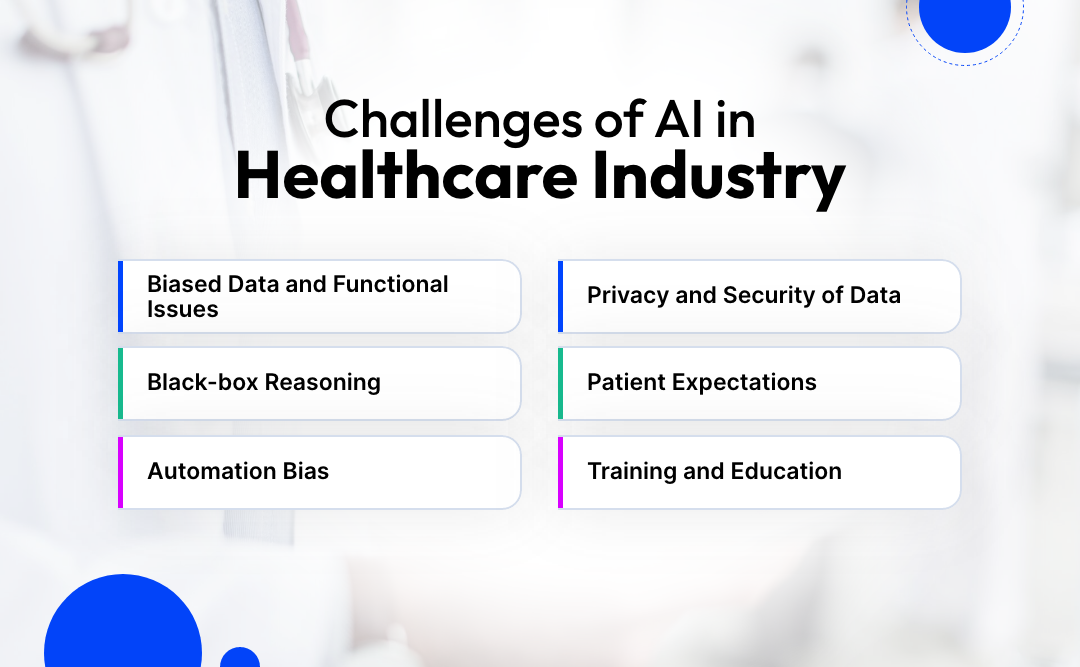
1. Biased Data and Functional Issues:
Bias is a major concern when it comes to AI. Bias may occur for a variety of reasons. For example, data used to train AI programs — or rules used to create algorithms — could be biased. Bias can also occur due to a variation in the data used for training or the environment or how you can apply an AI tool or program. Learn more about functional issues and biased data.
2. Black-box Reasoning:
It isn’t easy to understand how many of the cutting-edge AI systems, especially machine learning systems that have great potential for revolutionizing healthcare, produce their results. This unidentified function is known as “black box reasoning” or “black box decision-making,” which can have serious implications for patient safety, judgment, and liability. Learn more about black box reasoning.
3. Automation Bias
Humans, by nature, are vulnerable to cognitive errors resulting from knowledge deficits, faulty heuristics, and affective influences/situativity. These cognitive errors are known to cause medical mistakes and harm to patients, especially when it comes to delayed or incorrect diagnoses. AI can lead to cognitive errors, such as the “automation error,” which is known in healthcare.
4. Privacy and Security of Data
Healthcare organizations and providers are facing increasing challenges in securing sensitive and confidential data while complying with federal and state privacy regulations. AI is a dichotomous technology that presents similar challenges due to its dual nature. It requires large quantities of data and a variety of types, but it can be vulnerable to privacy and cybersecurity issues. Learn more about data security and privacy.
5. Patient Expectations
AI has the potential to improve patient outcomes by advancing population health management, risk stratification, and identification, diagnosis, and Treatment. Even with this promise, there are still questions about how patients will react and interact with these new technologies and how they will impact the relationship between providers and their patients. Learn more about the patient’s expectations.
6. Training and Education
AI’s emergence, its expansion into healthcare, and its sheer scale point to significant educational and training needs for medical students. These needs are not just about developing AI skills; they also require a paradigm shift in medical education.
What is the Future of AI in Healthcare Industry?
Artificial intelligence is a force of good in the healthcare industry. Its positive aspects and negatives are both present. However, in general, you can see that most of healthcare professionals will use AI apps and businesses will develop more.
It already plays an important role in understanding patient needs through detailed data analysis. Also, medical professionals will likely rely even more on it for guidance and assistance, using it to accurately and timely treat patients.
The role of artificial intelligence in medicine is ultimately to eliminate human errors, improve care delivery, and make life easier for hardworking medical professionals.
The healthcare environment will use AI technology in the near future, whether you are a medical professional or need Treatment yourself.
Conclusion
As we look ahead to 2024, the role of AI in the healthcare industry is poised to be transformative. Healthcare software development solutions will continue to harness AI’s power, improving patient care, diagnostics, and operational efficiency through development.
The integration of AI promises a future where healthcare becomes more precise, accessible, and effective. Embracing these advancements is crucial for a healthier, more technologically-driven healthcare landscape.
FAQ
1. What Are the Benefits of AI in Healthcare Industry?
The advantages of AI in healthcare industry include faster and more accurate diagnostics, personalized treatment plans, improved patient monitoring, and streamlined administrative tasks. It enhances healthcare efficiency, reduces costs, and ultimately saves lives by assisting healthcare professionals in making informed decisions and providing better patient care.
2. How to Build Healthcare Software?
To build healthcare software for your business, you need to follow the below steps:
- Define the project scope
- Gather requirements
- Design the user interface
- Develop the software
- Test rigorously
- Ensure compliance with healthcare regulations.
3. How Much Does it Cost to Develop a Healthcare App?
The cost of developing a healthcare app can vary significantly based on factors like complexity, features, platform, and location of development. A simple app might start at $8,000, while more complex solutions with advanced features can exceed $25,000 or more, inclusive of design, development, testing, and regulatory compliance expenses.
4. Can AI Assist with Regulatory Compliance in the Healthcare Sector?
Yes, AI can play a crucial role in healthcare regulatory compliance by automating data monitoring, ensuring adherence to privacy laws like HIPAA, and facilitating reporting, ultimately enhancing security and transparency.



